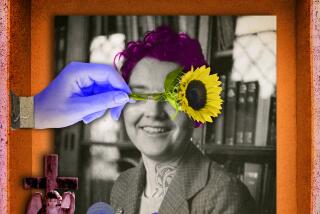A Death of Oneâs Own, Gerda Lerner...
A Death of Oneâs Own, Gerda Lerner (University of Wisconsin). While effective on stage or screen, death, in reality, doesnât make for a good show. It is slow, surreptitious and, as Rainer Maria Rilke wrote, ever present, âthe way the fruit carries the pit within itself. The children have a small one inside and the grown-ups a big one.â Thereâs little melodrama or self-pity in this 1978 account of the death of the authorâs husband of 33 years, only an extraordinarily personal evocation of her struggle to achieve peace of mind through realism rather than nihilism. Shortly after Carl Lerner enters the hospital, Gerda Lerner becomes âquickly absorbedâ in its rhythms, which âturned us into minor actors on (a) crowded stage.â But when Carlâs strength slowly departs, she lives with him for weeks, covered by a plastic bubble over his bed: âI look at my baby, the empty shell . . . which Death so kindly has left me as a little joke.â To the Lerners, however, acceptance of death doesnât mean submission to it, so Carl Lerner remains on guard, even in a poem he wrote days before his death: âThe robbers rob you at night, they steal / an arm, a leg, what / is left . . . with violet eyes / green skin, soundless fingers / they wait at the foot / of the bed . . . âtil one is tired / then they choose.â
Him With His Foot in His Mouth, (Pocket Books), To Jerusalem and Back (Penguin), Saul Bellow. The former collects short fiction from the 1970s, following the lives of Jewish immigrant children struggling with America as well as touchy, noisy male protagonists, each absorbed in a mission. The latter (also with its fair share of spirited characters) features interviews with Israelis from all levels of society. It is Bellowâs effort to help the international public understand the dilemmas faced by the nation and the people of Israel.
Choices, Liv Ullmann (Bantam). Like the outspoken characters she often plays on stage and screen, Liv Ullmann, in this witty, emotional autobiography, underscores the importance of taking authority over our own lives. She reflects on working in the Third World for UNICEF (we canât change the world, she acknowledges, but âsome traces of all of us are left behindâ) on character acting (âI whisper her words and imagine her thoughtsâ) and on feminism (âLike many women in their 40s, I grew up under strict authority, where choices for the present as well as choices for the future were clearly understood to be choices already decided uponâ).
Great Operatic Disasters, Hugh Vicker (St. Martinâs). Hugh Vickerâs witty humor makes it all the more fun to read about the tenor who swallowed his mustache, the live horse that mistook the orchestra pit for a water jump, the opening that was interrupted--permanently--by an eruption of Vesuvius and the continuing foibles in staging â âTosca,â by far the most jinxed of operas, as âMacbethâ is in the theatre.â
The Cruise of a Deathtime, Marian Babson; Death in Sheepâs Clothing, Stella Phillips (Walker). Walkerâs British mystery series continues with these compositions for a single sitting. Festivities aboard a cruise ship are rudely interrupted in âThe Cruise of a Deathtimeâ after a homicidal maniac sneaks on board, while the sleuths in âDeath in Sheepâs Clothingâ embark on a leisurely search for the murderer of an antique dealer.
Style and Idea: Selected Writings of Arnold Schoenberg, edited by Leonard Stein; translated by Leo Black (University of California). This first paperback appearance of a 1975 digest by Leonard Stein, director of the Schoenberg Institute at USC and Arnold Schoenbergâs former assistant, includes writings on critics and criticism, modern music and folk music and nationalism. Schoenberg, whose work began to be widely appreciated after his death in 1951, traveled to the furthest extreme of German post-romanticism--of Schoenbergâs 1903 symphonic poem âPelleas und Melisande,â critic Harold Blumenfeld wrote, âovergorgeous, overripe harmonies invite amorphousness and induce a drugged sense of bittersweet anaesthesiaâ--before abandoning passionate melody, lush harmony and opulent orchestration for the 12-tone system.
More to Read
The biggest entertainment stories
Get our big stories about Hollywood, film, television, music, arts, culture and more right in your inbox as soon as they publish.
You may occasionally receive promotional content from the Los Angeles Times.










